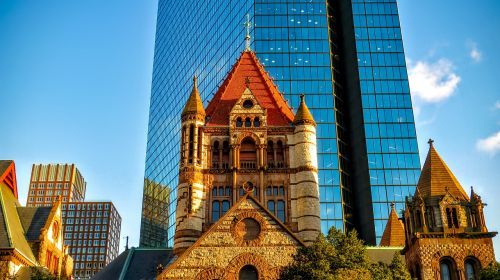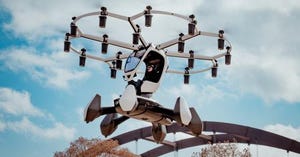Jascha Franklin-Hodge, CIO for the City of Boston, tells Jeremy Coward how Boston is pushing the envelope when it comes to citizen-centric Smart City projects.
May 31, 2017

Jascha Franklin-Hodge is CIO for the City of Boston, managing the Department of Innovation and Technology as well as the central IT department for Boston city.
His department oversees conventional aspects of IT, fixing government desktop computers when they break, and keeping internal networks running, but it also does things outside the remit of traditional IT — working to encourage private investment in broadband infrastructure, and helping to support programs that provide better technology access and skills training for the individuals who need them.
But there is also a digital team that focuses on digital service delivery and engagement. It aims to deliver “exceptional digital experiences” for residents, rivaling or improving on the experience provided by private sector companies.
In a month's time, Jascha will sit on the City CIO Leaders Panel at the Smart Cities Summit to discuss what a smart city should look like and whose responsibility it is to pay for it. Ahead of the conference, IoT World News wanted to pick his brain and learn what smart city projects Boston has underway.
You've said you don't like to use the term 'smart city.' Why's that?
“The term 'smart city' usually means technology-focused and vendor-driven, with aims to integrate tech into government operations. Companies that use the term often have a piece of technology they're looking to sell, and it becomes a circular conversation where the goal is the use of technology, which becomes easily disconnected from government's underlying mission.
“Our job in government is to improve quality of life for the people that we serve, making the city we operate in a better place. How do we make our schools a great place to get an education? How do we give people greater access to green space? How can we create affordable housing and give people access to the transportation services they need to get to and from home or work? These are our priorities.
“The technology we use, whether it's 'smart' or traditional, exists to serve these larger objectives. I don't necessarily care how smart of a city we are — I care how good we are at helping people with their daily lives. Technology helps, but we keep a frame around it. I'm always reminding myself and the people around me that our job is not to deliver technology, it's to help other parts of the city deliver great outcomes.”
So how is Boston using smart technology to improve the lives of its citizens?
“We are doing a lot with technology to improve the effectiveness of government operations with data, analytics and digital channels, to meet the expectations people have today about how they should be able to interact with their government.
“For example, we use data captured by the app Waze to monitor traffic patterns and road speeds. It's ingested and analyzed to track congestion and run experiments for new approaches to city policy. For instance, we've changed our enforcement policy on double parking — now enforcement officers tell people to move along rather than ticketing them. And when we retimed traffic signals, we used Waze data to widen our analysis of the area affected.
“These impacts are measured with data that we didn't have access to ten years ago. These new tools let us test more experiments in a shorter time period and stay agile, learning faster and delivering outcomes faster.”
How advanced is Boston as a smart city currently?
“In many ways, we're very sophisticated, with analytics programs that are very cutting-edge as cities go. Boston is right up there with Chicago, New York and New Orleans.
“But we distinguish ourselves by being less focused on hard-core math and more focused on how we can make data useful in an everyday context. Sometimes the most effective use of data is finding the way to present it that is most accessible, often to an executive that is not a data specialist, creating dashboards that tell a story with the city's data. We work with these executives city-wide to develop better uses for data and make the data more relevant to them.
“Our digital resources are second-to-none. The city's website has been entirely redeveloped to put people first — we learned how our residents think about services, and reordered the site to match their view of the services we provide.
“Hopefully, this will be the way of the future for other governments building digital experiences.”
How would you like Boston to look in 10 years' time? What smart city characteristics would you like to see developed?
“I expect our government will have a lot more people and divisions with skills that exist within our own department. To put it into perspective, our department used to have a typing pool — that used to be seen as a specialist skill that you couldn't expect everyone to do. Which seems comical, but some of the things we do currently, like data analytics and visualization, will probably become a lot more commonplace ten years from now.
“I want my team to innovate and educate, so that this work won't have to be outsourced to other teams or companies. Even now, the reality is that any department not incorporating technology isn't living up to its potential or meeting our constituents' expectations for how public services should be delivered.
“Otherwise, my aspiration for Boston aren't fundamentally rooted in technology. I want this to continue to be a diverse, affordable, healthy, beautiful city to live in. I want all of the things I and my fellow residents cherish to remain, and see further progress with our priorities: housing affordability, equitable access to education opportunities, and safe and reliable transportation.
“I don't think it's my job to just say 'here's how I want tech to be in Boston'. It's about how I can support these priorities.”
Are there any particularly outlandish solutions you'd like to bring to Boston?
“One of the biggest problems we'll wrestle with moving forward is changes to transportation systems and the role played by autonomous vehicles. A future where people use a massive fleet of autonomous vehicles as their main source of transportation has huge implications, including land use. By reusing all of that land currently used to store cars, we have a chance to massively reshape the physical environment of our cities and rethink the design of our city in general.
“We're on the cusp of some really major technological transformation, and I want to help reshape Boston to benefit its residents.”
Is there a time frame for when autonomous vehicles will be used?
“The people I talk to on the optimistic side say fully autonomous vehicles will be on the road in five years, or maybe 15 years. And we're already feeling this a bit now in the form of services like Uber and Lyft — they operate in a similar way that an autonomous network of vehicles might operate.”
What roles should the public and private sectors ideally play as a smart city is developed?
“Private sector organizations have a big role to play; in no modern country is government the exclusive provider of every service. Boston wants to encourage private sector investment and innovation, as private companies can often innovate at a quicker pace.
“But we need to be mindful that in government we have fundamentally unique responsibilities. There's no private company in the world that has the obligation to treat every person equally, or deliver services even if they can't be done profitably. Meanwhile, our public education system is not a profit-making enterprise, our private education system is not a profit-making enterprise, nor should these things ever be profit-making enterprises, because we do them for greater societal good.
“So there's a healthy interplay where the private sector can be faster and nimbler, but we've got to make sure that equity, fairness and all our big social goals are represented, and that we make progress on those things.”
What are your views on cybersecurity in smart cities? Does that fall under your remit?
“Well, it's no secret that government of all stripes is struggling to stay ahead. There have been and will be data breaches that affect cities. It's the job of people like me and our CISO to make sure, as we build new technologies, that we're thoughtful about how these technologies might be exploited or undermined, and to make investments appropriately.
“Talk to people whose job it is to keep systems cyber-secure, and they're often a depressed bunch because they realize they're up against such tremendous challenges. They know it's not a war you win, it's just a case where you're already trying to remain one step ahead.”
We've been told before that cities will need Chief Smart Cities Officers. Do you subscribe to that view?
“No, I think it's a terrible idea. Cities need to be focused on the problems they solve, not just the technology they provide. We need to be putting people in roles where they are providing support for services and residents, and helping to educate other departments to utilize technology to do the same.”
About the Author(s)
You May Also Like

.jpeg?width=700&auto=webp&quality=80&disable=upscale)
.png?width=700&auto=webp&quality=80&disable=upscale)


.png?width=300&auto=webp&quality=80&disable=upscale)
